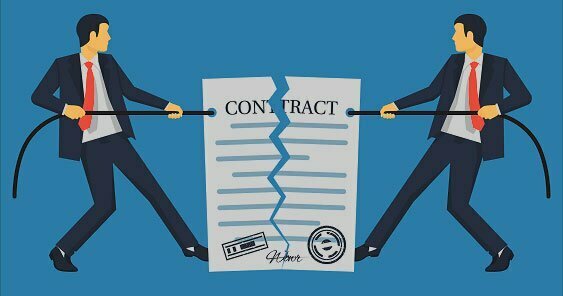When two or more parties sign into a contract, they are usually obligated to do specified tasks. A breach of contract occurs when one or more parties fail to comply with or execute their contractual commitments. Non-performance, late delivery, and non-compliance with norms are all examples of breaches. When a contract is broken, the non-breaching party has the right to pursue legal action.
Is there a variety of them?
You may be involved in many forms of breach of contract cases depending on the details of your case. These are some of them:
- Breach of material trust. The breach is significant enough to cause the contract to be terminated because it prevents one or both parties from completing their obligations. This would include receiving the incorrect item.
- Breach planned ahead of time. This occurs when one side believes the other will break the contract for a specific reason. It can also happen when one party informs the other that it will not be carrying out the terms of the contract.
- A partial breach has occurred. When one party fails to meet a little or relatively trivial detail, but can still complete its overall job, this is referred to as a partial or minor breach. It could also be due to a contract’s technological flaws.
A Contract's Validity
While an oral contract can be enforced in court, some agreements require written documentation to stand up in court. Contracts involving sales of products or services for more than $500, contracts that are valid for more than a year after signing, and real estate transfer/sale contracts are examples of these.
The Court's Role in Validity Determination
When your breach of contract lawsuit reaches court, the judge examines each party’s responsibilities and evaluates if everyone has fulfilled their obligations. The court examines the contract carefully for any changes that may have resulted in the alleged breach.
It is up to the court to decide whether the breach was caused by a legitimate basis. For example, if a defendant claims that a plaintiff suppressed or misrepresented material information, resulting in a fraudulent contract, the court must investigate this claim. A defendant could also allege that the plaintiff utilized threats or physical force to compel the defendant to sign the contract under duress.
Your Role in Contract Breach Litigation
Whether you are the breaching or non-breaching party in a breach of contract case determines your involvement.
Non-Breaching Party
You have the right to seek legal redress as a non-breaching party. In this scenario, take the following procedures.
- Look over the contract carefully for any sections that pertain to violations. Do they highlight the potential for damages or a time limit for the breaching party to repair the breach?
- Notify the breaching party of the breach and provide them the opportunity to repair the situation or come up with a mutually acceptable solution.
- If the last stage fails, the non-breaching party will have to sue the breaching party for breach of contract.
Breaching Party
Consider taking these procedures if you are judged liable for a contract breach.
- Look over the contract to see what you might be able to do if something goes wrong. While a contract breach may result in instant termination, it may also offer you time to fix the issue before the non-breaching party takes legal action.
- If you are unable to entirely repair the breach, try to talk to the non-breaching party about other solutions. This could lead to a conclusion without the need for legal intervention.
- If the non-breaching party sues you, you must defend your case in court, ideally with the help of a breach of contract litigation attorney.
Breach of Contract Remedies
The most common outcomes of breach of contract lawsuit cases are damages and injunctions. Damages are the monetary amounts that a defendant must pay a plaintiff to compensate for his or her loss or suffering. An injunction directs a defendant to stop doing anything that could harm or injure the plaintiff. Non-breaching parties may also seek contract termination or reparation.
Conclusion
If you believe that a party with whom you have entered into a contract is violating its terms in some way, talk to the other party first to see if you can work out a solution together. If this is not possible, you should consult an attorney who specializes in breach of contract disputes as soon as possible because the statute of limitations may apply later.

